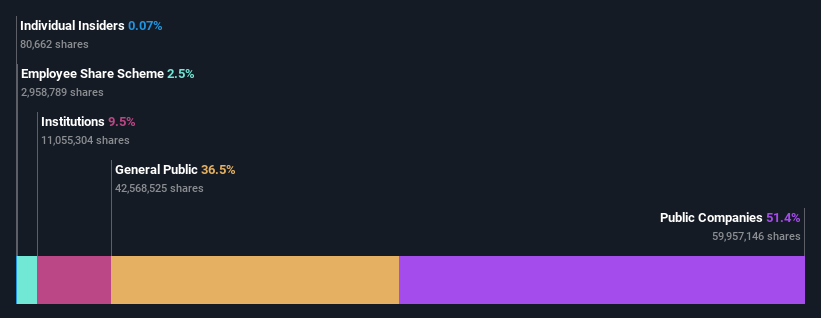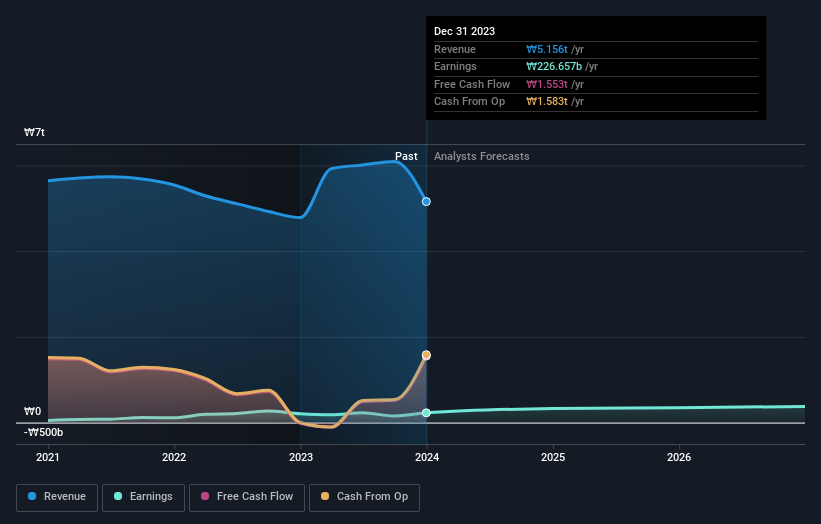Stock Analysis
- South Korea
- /
- Insurance
- /
- KOSE:A000370
Public companies are Hanwha General Insurance Co., Ltd.'s (KRX:000370) biggest owners and were rewarded after market cap rose by ₩67b last week

Key Insights
- Hanwha General Insurance's significant public companies ownership suggests that the key decisions are influenced by shareholders from the larger public
- Hanwha Life Insurance Co., Ltd. owns 51% of the company
- Ownership research along with analyst forecasts data help provide a good understanding of opportunities in a stock
If you want to know who really controls Hanwha General Insurance Co., Ltd. (KRX:000370), then you'll have to look at the makeup of its share registry. We can see that public companies own the lion's share in the company with 51% ownership. That is, the group stands to benefit the most if the stock rises (or lose the most if there is a downturn).
As a result, public companies were the biggest beneficiaries of last week’s 14% gain.
Let's delve deeper into each type of owner of Hanwha General Insurance, beginning with the chart below.
See our latest analysis for Hanwha General Insurance

What Does The Institutional Ownership Tell Us About Hanwha General Insurance?
Many institutions measure their performance against an index that approximates the local market. So they usually pay more attention to companies that are included in major indices.
We can see that Hanwha General Insurance does have institutional investors; and they hold a good portion of the company's stock. This can indicate that the company has a certain degree of credibility in the investment community. However, it is best to be wary of relying on the supposed validation that comes with institutional investors. They too, get it wrong sometimes. It is not uncommon to see a big share price drop if two large institutional investors try to sell out of a stock at the same time. So it is worth checking the past earnings trajectory of Hanwha General Insurance, (below). Of course, keep in mind that there are other factors to consider, too.

We note that hedge funds don't have a meaningful investment in Hanwha General Insurance. Looking at our data, we can see that the largest shareholder is Hanwha Life Insurance Co., Ltd. with 51% of shares outstanding. With such a huge stake in the ownership, we infer that they have significant control of the future of the company. With 4.0% and 2.5% of the shares outstanding respectively, National Pension Service and Hanwha General Insurance Co., Ltd., ESOP are the second and third largest shareholders.
While it makes sense to study institutional ownership data for a company, it also makes sense to study analyst sentiments to know which way the wind is blowing. There are plenty of analysts covering the stock, so it might be worth seeing what they are forecasting, too.
Insider Ownership Of Hanwha General Insurance
While the precise definition of an insider can be subjective, almost everyone considers board members to be insiders. Management ultimately answers to the board. However, it is not uncommon for managers to be executive board members, especially if they are a founder or the CEO.
I generally consider insider ownership to be a good thing. However, on some occasions it makes it more difficult for other shareholders to hold the board accountable for decisions.
Our most recent data indicates that insiders own less than 1% of Hanwha General Insurance Co., Ltd.. It has a market capitalization of just ₩559b, and the board has only ₩387m worth of shares in their own names. We generally like to see a board more invested. However it might be worth checking if those insiders have been buying.
General Public Ownership
The general public, who are usually individual investors, hold a 37% stake in Hanwha General Insurance. This size of ownership, while considerable, may not be enough to change company policy if the decision is not in sync with other large shareholders.
Public Company Ownership
We can see that public companies hold 51% of the Hanwha General Insurance shares on issue. This may be a strategic interest and the two companies may have related business interests. It could be that they have de-merged. This holding is probably worth investigating further.
Next Steps:
While it is well worth considering the different groups that own a company, there are other factors that are even more important. Consider for instance, the ever-present spectre of investment risk. We've identified 3 warning signs with Hanwha General Insurance , and understanding them should be part of your investment process.
But ultimately it is the future, not the past, that will determine how well the owners of this business will do. Therefore we think it advisable to take a look at this free report showing whether analysts are predicting a brighter future.
NB: Figures in this article are calculated using data from the last twelve months, which refer to the 12-month period ending on the last date of the month the financial statement is dated. This may not be consistent with full year annual report figures.
Valuation is complex, but we're helping make it simple.
Find out whether Hanwha General Insurance is potentially over or undervalued by checking out our comprehensive analysis, which includes fair value estimates, risks and warnings, dividends, insider transactions and financial health.
View the Free AnalysisHave feedback on this article? Concerned about the content? Get in touch with us directly. Alternatively, email editorial-team (at) simplywallst.com.
This article by Simply Wall St is general in nature. We provide commentary based on historical data and analyst forecasts only using an unbiased methodology and our articles are not intended to be financial advice. It does not constitute a recommendation to buy or sell any stock, and does not take account of your objectives, or your financial situation. We aim to bring you long-term focused analysis driven by fundamental data. Note that our analysis may not factor in the latest price-sensitive company announcements or qualitative material. Simply Wall St has no position in any stocks mentioned.
About KOSE:A000370
Hanwha General Insurance
Hanwha General Insurance Co., Ltd. provides insurance services in South Korea.
Flawless balance sheet, undervalued and pays a dividend.

